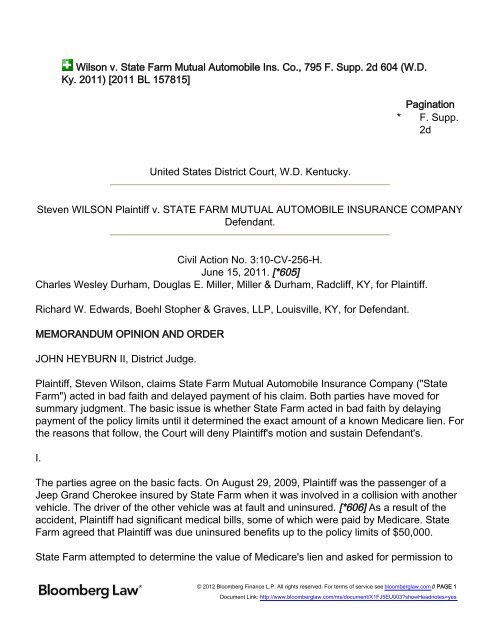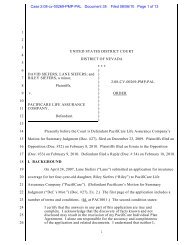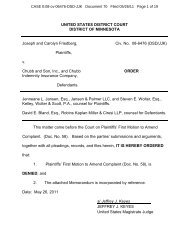Wilson v. State Farm Mutual Automobile Insurance ... - Bad Faith Blog
Wilson v. State Farm Mutual Automobile Insurance ... - Bad Faith Blog
Wilson v. State Farm Mutual Automobile Insurance ... - Bad Faith Blog
You also want an ePaper? Increase the reach of your titles
YUMPU automatically turns print PDFs into web optimized ePapers that Google loves.
<strong>Wilson</strong> v. <strong>State</strong> <strong>Farm</strong> <strong>Mutual</strong> <strong>Automobile</strong> Ins. Co., 795 F. Supp. 2d 604 (W.D.<br />
Ky. 2011) [2011 BL 157815]<br />
Pagination<br />
* F. Supp.<br />
2d<br />
United <strong>State</strong>s District Court, W.D. Kentucky.<br />
Steven WILSON Plaintiff v. STATE FARM MUTUAL AUTOMOBILE INSURANCE COMPANY<br />
Defendant.<br />
Civil Action No. 3:10-CV-256-H.<br />
June 15, 2011. [*605]<br />
Charles Wesley Durham, Douglas E. Miller, Miller & Durham, Radcliff, KY, for Plaintiff.<br />
Richard W. Edwards, Boehl Stopher & Graves, LLP, Louisville, KY, for Defendant.<br />
MEMORANDUM OPINION AND ORDER<br />
JOHN HEYBURN II, District Judge.<br />
Plaintiff, Steven <strong>Wilson</strong>, claims <strong>State</strong> <strong>Farm</strong> <strong>Mutual</strong> <strong>Automobile</strong> <strong>Insurance</strong> Company ("<strong>State</strong><br />
<strong>Farm</strong>") acted in bad faith and delayed payment of his claim. Both parties have moved for<br />
summary judgment. The basic issue is whether <strong>State</strong> <strong>Farm</strong> acted in bad faith by delaying<br />
payment of the policy limits until it determined the exact amount of a known Medicare lien. For<br />
the reasons that follow, the Court will deny Plaintiff's motion and sustain Defendant's.<br />
I.<br />
The parties agree on the basic facts. On August 29, 2009, Plaintiff was the passenger of a<br />
Jeep Grand Cherokee insured by <strong>State</strong> <strong>Farm</strong> when it was involved in a collision with another<br />
vehicle. The driver of the other vehicle was at fault and uninsured. [*606] As a result of the<br />
accident, Plaintiff had significant medical bills, some of which were paid by Medicare. <strong>State</strong><br />
<strong>Farm</strong> agreed that Plaintiff was due uninsured benefits up to the policy limits of $50,000.<br />
<strong>State</strong> <strong>Farm</strong> attempted to determine the value of Medicare's lien and asked for permission to<br />
© 2012 Bloomberg Finance L.P. All rights reserved. For terms of service see bloomberglaw.com // PAGE 1<br />
Document Link: http://www.bloomberglaw.com/ms/document/X1FJ5EU003?showHeadnotes=yes
<strong>Wilson</strong> v. <strong>State</strong> <strong>Farm</strong> <strong>Mutual</strong> <strong>Automobile</strong> Ins. Co., 795 F. Supp. 2d 604 (W.D. Ky. 2011), Court Opinion<br />
discuss the lien with Medicare. Plaintiff refused the request and instead asked <strong>State</strong> <strong>Farm</strong> to<br />
deposit the full policy limits in an escrow account from which the Medicare lien would be paid.<br />
Plaintiff agreed "to hold <strong>State</strong> <strong>Farm</strong> . . . harmless from any claim by Medicare." Medicare was<br />
not involved in nor bound by this agreement. As an alternative, <strong>State</strong> <strong>Farm</strong> suggested<br />
including Medicare as a payee on the settlement check. Plaintiff rejected this request. Finally,<br />
<strong>State</strong> <strong>Farm</strong> decided to await Medicare's determination of the value of its lien and then issue<br />
separate checks to Medicare and Plaintiff.<br />
While waiting for the information from Medicare, Plaintiff filed the instant action, claiming it<br />
was bad faith to delay payment of the $50,000 more than thirty days merely to protect<br />
Defendant from later liability to Medicare. Two months later, <strong>State</strong> <strong>Farm</strong> learned the value of<br />
the Medicare lien. The following day, <strong>State</strong> <strong>Farm</strong> paid both Medicare and Plaintiff.<br />
II.<br />
Plaintiff makes two claims. The first is a traditional bad faith claim under KRS 304.12-230,the<br />
statutory embodiment of common law bad faith claims. Under this statute, "[n]ot attempting in<br />
good faith to effectuate prompt, fair and equitable settlements of claims in which liability has<br />
become reasonably clear" can constitute bad faith. KRS 304.12-230(6). In addition, he asserts<br />
a separate claim under KRS 304.12-235,which requires that "[a]ll claims arising under the<br />
terms of any contract of insurance shall be paid to the named insured person or heath care<br />
provider not more than thirty (30) days from the date upon which notice and proof of claim, in<br />
the substance and form required by the terms of the policy, are furnished the insurer." KRS<br />
304.12-235(1).<br />
Summary judgment is appropriate when "there is no genuine dispute as to any material fact<br />
and the movant is entitled to judgment as a matter of law." Fed.R.Civ.P. 56(a). A genuine<br />
dispute exists if "the evidence is such that a reasonable jury could return a verdict for the nonmoving<br />
party." Anderson v. Liberty Lobby, Inc.,477 U.S. 242,248 (1986). In this case, the<br />
parties only dispute the relevance of the facts to the applicable law.<br />
III.<br />
To have acted in bad faith, an insurance company must (1) have an obligation to pay the<br />
claim at issue; (2) not have a reasonable basis for failing to pay the claim; and (3) know that it<br />
lacked a reasonable basis to delay payment or act in reckless disregard to the existence of<br />
that basis. Wittmer v. Jones, 864 S.W.2d 885,890 (Ky. 1993) (quoting Fed. Kemper Ins. Co. v.<br />
Hornback,Ky., 711 S.W.2d 844,846-47 (Ky. 1986)).[fn1] The parties dispute whether <strong>State</strong><br />
<strong>Farm</strong> had a reasonable basis to delay payment.<br />
Mere delay of payment alone does not constitute bad faith. Motorist Mut. Ins. Co. v. Glass,<br />
© 2012 Bloomberg Finance L.P. All rights reserved. For terms of service see bloomberglaw.com // PAGE 2<br />
Document Link: http://www.bloomberglaw.com/ms/document/X1FJ5EU003?showHeadnotes=yes
<strong>Wilson</strong> v. <strong>State</strong> <strong>Farm</strong> <strong>Mutual</strong> <strong>Automobile</strong> Ins. Co., 795 F. Supp. 2d 604 (W.D. Ky. 2011), Court Opinion<br />
996 S.W.2d 437,452 ([*607]Ky. 1997). Furthermore, Kentucky law suggests that an insurer<br />
has not acted in bad faith if the reason for denying payment was "fairly debatable as to either<br />
the law or the facts." Empire Fire & Marine Ins. Co. v. Simpsonville Wrecker Serv. Inc.,880<br />
S.W.2d 886,890 (Ky. Ct. App. 1994). In fact, "[b]efore the cause of action exists in the first<br />
place, there must be evidence sufficient to warrant punitive damages . . ." Wittmer, 864<br />
S.W.2d at 890. In other words, bad faith is outrageous conduct because <strong>State</strong> <strong>Farm</strong> had<br />
either an evil motive or reckless indifference to others' rights. Id. (quoting Restatement<br />
(Second) Torts, Sec. 909(2) (1979)).<br />
It appears that Plaintiff has the primary responsibility to repay Medicare. 42 C.F.R. §<br />
411.24(h). However, <strong>State</strong> <strong>Farm</strong> is absolutely liable to Medicare should Plaintiff not satisfy the<br />
Medicare lien from his settlement funds. 42 C.F.R. § 411.24(i)(1) (stating "If Medicare is not<br />
reimbursed . . ., the primary payer must reimburse Medicare even though it has already<br />
reimbursed the beneficiary or other party."). Moreover, <strong>State</strong> <strong>Farm</strong> may have an obligation to<br />
protect Medicare's lien under the Medicare Secondary Payer Act and its corresponding<br />
regulations. See 42 U.S.C. § 1395y(b)(2) and 42 CFR § 411.24(i)(1). For <strong>State</strong> <strong>Farm</strong> to<br />
consider these obligations seems responsible.<br />
Kentucky courts have not addressed this particular issue in the context of a bad faith claim.<br />
However, several courts have found it reasonable to include Medicare as a payee on a<br />
settlement check. Lewis v. Allstate Ins. Co.,No. 09-05-225-CV, 2006 WL 665790 (Tex. App.<br />
March 16, 2006) and Wall v. Leavitt,Civ. No. S-05-2553 FCD GGH, [2008 BL 246858],<br />
2008 WL 4737164, at *8 (E.D. Ca. Oct. 29, 2008) (stating that "it is only through the<br />
exercise of an extreme formalism, even stubbornness, that the Secretary can state that<br />
Medicare is not `required' to be named as a payee on third-party settlement checks in a<br />
situation where the settlement check will be issued prior to an initial determination").<br />
Certainly, where the Medicare lien is determinable, <strong>State</strong> <strong>Farm</strong> had sound reasons to try<br />
to determine the amount of it and take reasonable precautions to protect itself from<br />
overpayment.[fn2] Moreover, for <strong>State</strong> <strong>Farm</strong> to suggest including Medicare as a co-payee was<br />
certainly reasonable.<br />
Plaintiff argues that <strong>State</strong> <strong>Farm</strong> acted in pure self interest and that such overriding self interest<br />
coupled with the delayed settlement payment could constitute bad faith. The Court concludes,<br />
however, that to comply with federal law and to protect its own legitimate interest against<br />
overpayment is reasonable and certainly is not in bad faith. Defendant did not delay payment<br />
in order to pay less or harass Plaintiff. Motorists Mut. Ins. Co.,996 S.W.2d at 452-453<br />
(stating that "there must be proof or evidence supporting a reasonable inference that the<br />
purpose of the delay was to extort a more favorable settlement or to deceive the insured<br />
with respect to the applicable coverage"). While it may serve Defendant's self interest to<br />
comply with federal law, such action was not bad faith, especially when Plaintiff<br />
apparently refused to cooperate with Defendant's attempts to pay the claim more quickly.[fn3]<br />
© 2012 Bloomberg Finance L.P. All rights reserved. For terms of service see bloomberglaw.com // PAGE 3<br />
Document Link: http://www.bloomberglaw.com/ms/document/X1FJ5EU003?showHeadnotes=yes
<strong>Wilson</strong> v. <strong>State</strong> <strong>Farm</strong> <strong>Mutual</strong> <strong>Automobile</strong> Ins. Co., 795 F. Supp. 2d 604 (W.D. Ky. 2011), Court Opinion<br />
[*608]These undisputed facts cannot constitute bad faith on <strong>State</strong> <strong>Farm</strong>'s part.<br />
IV.<br />
Next, Plaintiff attempts to assert a separate claim under KRS 304.12-235. In addition to<br />
payment of the claim amount, this statute allows for twelve percent interest on the value of the<br />
final settlement"[i]f an insurer fails to make a good faith attempt to settle a claim within the<br />
time prescribed" and reasonable attorney's fees "[i]f an insurer fails to settle a claim within the<br />
time prescribed . . . and the delay was without reasonable foundation." KRS 304.12-235(2)<br />
and (3). Plaintiff might have a lower burden under this statute. See United Servs. Auto Ass'n<br />
v. Bult,183 S.W.3d 181,190 n. 9 (Ky. Ct. App. 2006) (stating that KRS 304-230 has a "much<br />
higher burden of proof" than KRS 304.12-235) and FB Ins. Co. v. Jones,864 S.W.2d 926, 929<br />
(Ky. Ct. App. 1993) (stating that "KRS 304.12-235 appears to be intended as a prod to<br />
prevent laxity in the adjustment of claims. KRS 304.12-230,however, speaks out against more<br />
egregious behavior."). Defendant suggests that it did not receive a complete "proof of claim"<br />
until it knew the value of Medicare's lien. Since <strong>State</strong> <strong>Farm</strong> paid both Plaintiff and Medicare<br />
the day after it received notice of the value of Medicare's lien, <strong>State</strong> <strong>Farm</strong> believes it acted<br />
well within the statutory guidelines. For all the reasons stated in Section III, <strong>State</strong> <strong>Farm</strong>'s delay<br />
in payment does not constitute bad faith, and, in fact, its multiple attempts to speed settlement<br />
suggest just the opposite. Defendant had a "reasonable foundation" to delay settlement by<br />
seeking assurances concerning the amount and payment of the lien.<br />
Being otherwise sufficiently advised,<br />
IT IS HEREBY ORDERED that <strong>State</strong> <strong>Farm</strong>'s motion for summary judgment is SUSTAINED<br />
and the complaint is DISMISSED WITH PREJUDICE.<br />
IT IS FURTHER ORDERED that <strong>Wilson</strong>'s motion for summary judgment is DENIED.<br />
This is a final order.<br />
June 14, 2011<br />
[fn1] Plaintiff also argues Defendant acted in bad faith because Defendant violated KRS<br />
304.12-235(1) in that payment occurred more than thirty days after <strong>Wilson</strong> submitted his claim<br />
to <strong>State</strong> <strong>Farm</strong>. However, "there can be no private cause of action [for bad faith] for mere<br />
`technical violation' of the UCSPA [Unfair Claims Settlement Practices Act]." Motorists Mut.<br />
Ins. Co. v. Glass, 996 S.W.2d 437,452 (Ky. 1997) (quoting Wittmer,864 S.W.2d at 890).<br />
[fn2] In a slightly different circumstance, the Kentucky Supreme Court has said that in a first<br />
party claim an insured's willingness to settle on a reasonable basis is a precondition to a bad<br />
© 2012 Bloomberg Finance L.P. All rights reserved. For terms of service see bloomberglaw.com // PAGE 4<br />
Document Link: http://www.bloomberglaw.com/ms/document/X1FJ5EU003?showHeadnotes=yes
<strong>Wilson</strong> v. <strong>State</strong> <strong>Farm</strong> <strong>Mutual</strong> <strong>Automobile</strong> Ins. Co., 795 F. Supp. 2d 604 (W.D. Ky. 2011), Court Opinion<br />
faith claim. See Motorist Mut. Ins. Co., 996 S.W.2d at 455.<br />
[fn3] Plaintiff has cited to a Pennsylvania state court opinion that is neither binding nor on<br />
point. Zaleppa v. Seiwell,9 A.3d 632, 639 (Pa. Super. Ct. 2010). Though this case decided<br />
"that the MSPA . . . prohibits private entities from asserting the interests of the United <strong>State</strong>s<br />
government in a post-trial motion or any other phase of the litigation," that court was<br />
presented with a post-trial motion seeking to add Medicare as a payee on the judgment when<br />
no evidence of Medicare payments had been presented. Though the decision speaks broadly<br />
of the inability of an individual or company to assert Medicare's rights, the opinion does not<br />
even remotely address the notion that an insurance company acts in bad faith in considering a<br />
Medicare lien during settlement. Furthermore, a Florida appellate court came to a contrary<br />
conclusion, requiring Medicare be notified of the settlement and receive the portion of<br />
settlement it is due. Pollo Operations, Inc. v. Tripp,906 So.2d 1101,1105-06 (Fla. Dist. Ct.<br />
App. 2005).<br />
© 2012 Bloomberg Finance L.P. All rights reserved. For terms of service see bloomberglaw.com // PAGE 5<br />
Document Link: http://www.bloomberglaw.com/ms/document/X1FJ5EU003?showHeadnotes=yes
<strong>Wilson</strong> v. <strong>State</strong> <strong>Farm</strong> <strong>Mutual</strong> <strong>Automobile</strong> Ins. Co., 795 F. Supp. 2d 604 (W.D. Ky. 2011), Court Opinion<br />
General Information<br />
Result(s)<br />
Related docket(s)<br />
Topic<br />
Motion For Summary Judgment Sustained, Case Dismissed,<br />
Motion For Summary Judgment Denied<br />
3:10-cv-00256 (W.D. Ky.)<br />
Civil Procedure <strong>Insurance</strong> Law<br />
© 2012 Bloomberg Finance L.P. All rights reserved. For terms of service see bloomberglaw.com // PAGE 1<br />
Document Link: http://www.bloomberglaw.com/ms/document/X1FJ5EU003?showHeadnotes=yes




